How to Optimize for AI Search Engines: Down-to-Earth Guide for Traditional Businesses

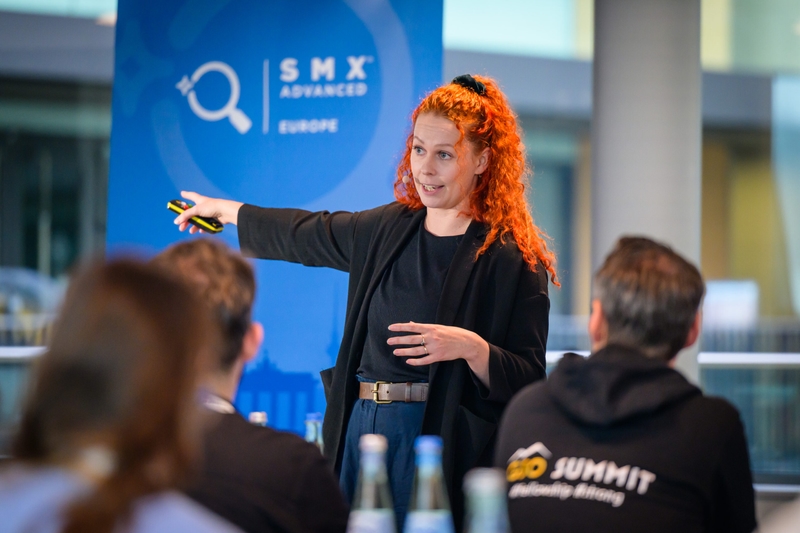
Imagine you run a home renovation company. You’ve built your business on trust-based marketing: referrals, word-of-mouth, and showing up when someone types “kitchen remodeler near me” or “bathroom renovation cost” into Google.
For years, that worked. You invested in a decent website, uploaded project photos, and maybe even wrote a few blog articles.
But lately, something feels off.
- Traffic is slowing.
- Your phone rings less.
- Leads that used to come from search engines aren't showing up the way they used to.
And nobody warned you that the search itself had changed.
Before you go into full panic mode, keep in mind that, according to research,
- 95.3% of ChatGPT users visited Google
- 14.3% of Google users visited ChatGPT
- ChatGPT had 5.8 billion visits compared to Google’s 83.8 billion visits.
The Big Shift: Customers Aren’t Searching the Same Way Anymore
Business owners and marketers have suddenly heard about tools like ChatGPT, Perplexity, Microsoft Copilot, and Gemini.
People aren’t always typing keywords into Google anymore, they’re asking AI directly.
Questions like:
- “What’s the best way to remodel a small bathroom on a budget?”
- “Which renovation companies near me have the best customer reviews?”
- “How much should I expect to pay for a kitchen renovation in 2026?”
- “Who is the most reliable basement finishing contractor in my area?”
Traditional search would send them to websites.
AI search gives them instant summaries, recommendations, and sometimes even a shortlist of companies, all without anyone ever clicking a link.
Most business and site owners are left wondering:
If AI can answer the customer directly, how will the customer ever find us?
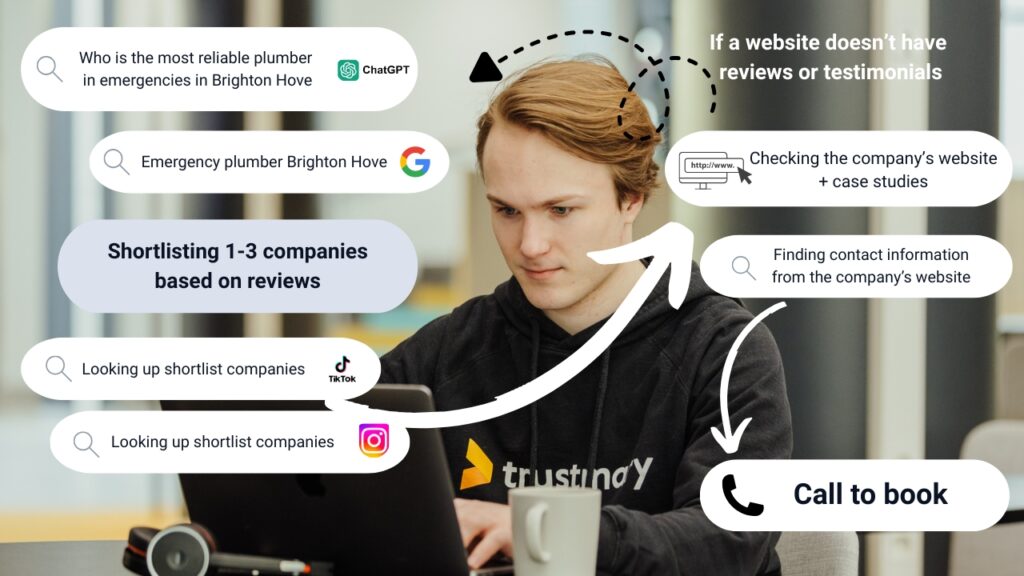
Keyword-Based Search Isn’t Enough Anymore
In the past, being found online was about ranking for the right keywords or user queries.
- “bathroom remodeler”
- “kitchen renovation company”
- “home addition contractor”
However, even traditional search engines have become AI powered search engines.
When you try to look for information on Google, it might give you AI overviews as the first result.
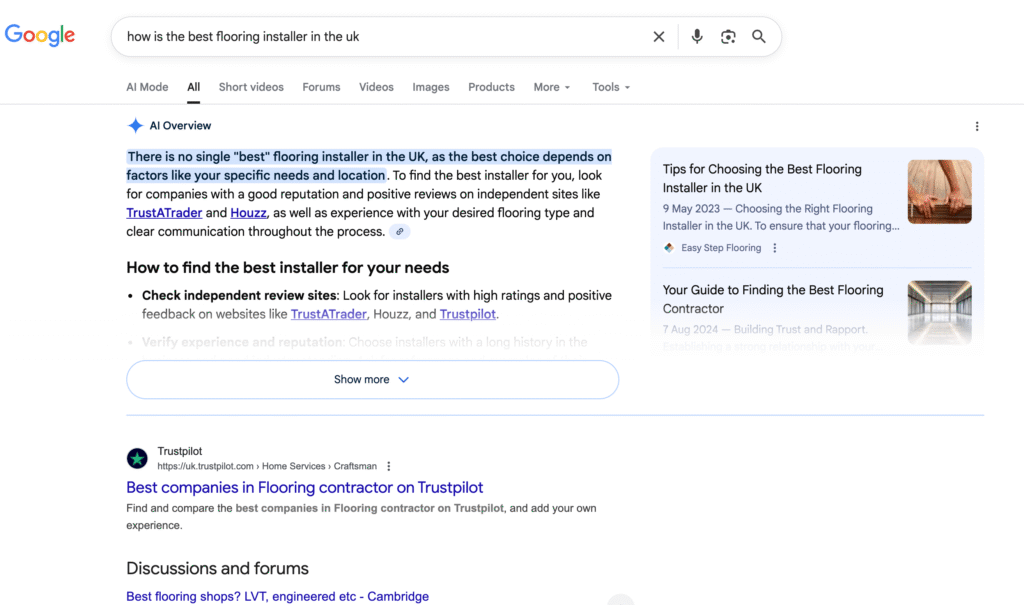
With AI search engines, people tend to ask longer questions.
AI search doesn’t rely on those exact phrases. Customers can ask questions in everyday language, and the AI understands the natural language queries, not just the words.
People can also ask follow up questions from AI search engines.
If your business isn’t mentioned in online reviews, articles, or trusted sources that AI tools rely on, you may simply never show up.
The owner starts to see the problem clearly:
AI doesn’t pick businesses based on who has the most keywords. It picks businesses based on trust, reputation, and real customer experiences.
Example of Search Path in AI Search Engines
AI search starts with a very specific description of what is needed.
In this case, I used ChatGPT to look for roof leak fixes in the West London area.
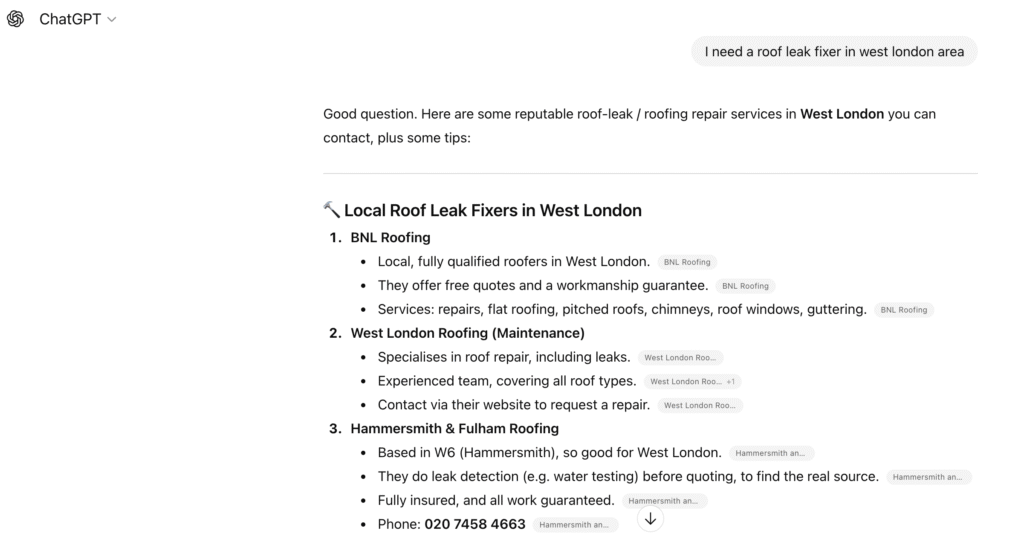
I get a shortlist of companies, and I'm then asked if I'd like to get the exact postcode areas, and filtering by price or customer reviews.
After getting the breakdown, I get additional information without asking.
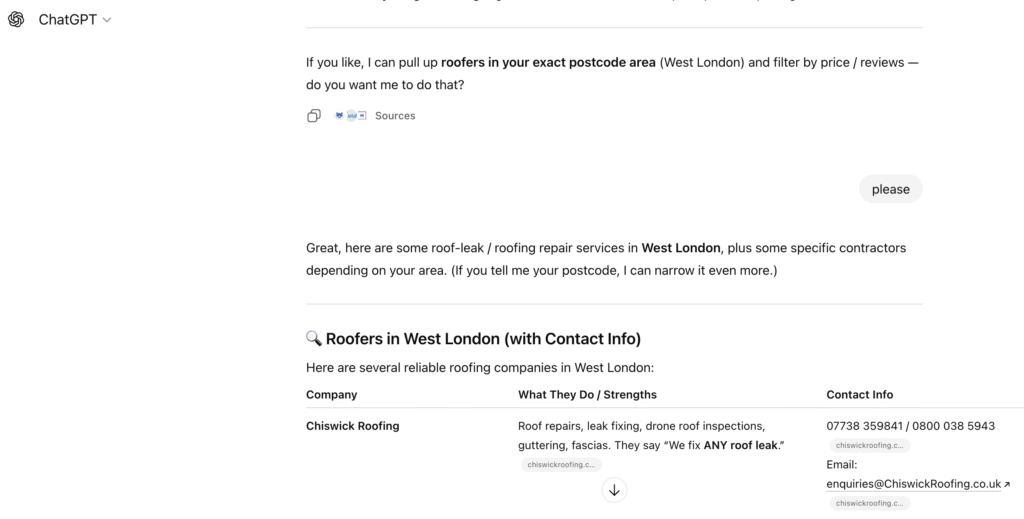
ChatGPT recommends the next steps to take. This is something a traditional search engine wouldn't do.
Then, I'm asked if I'd like to see the customer reviews for these companies that were shortlisted for me.
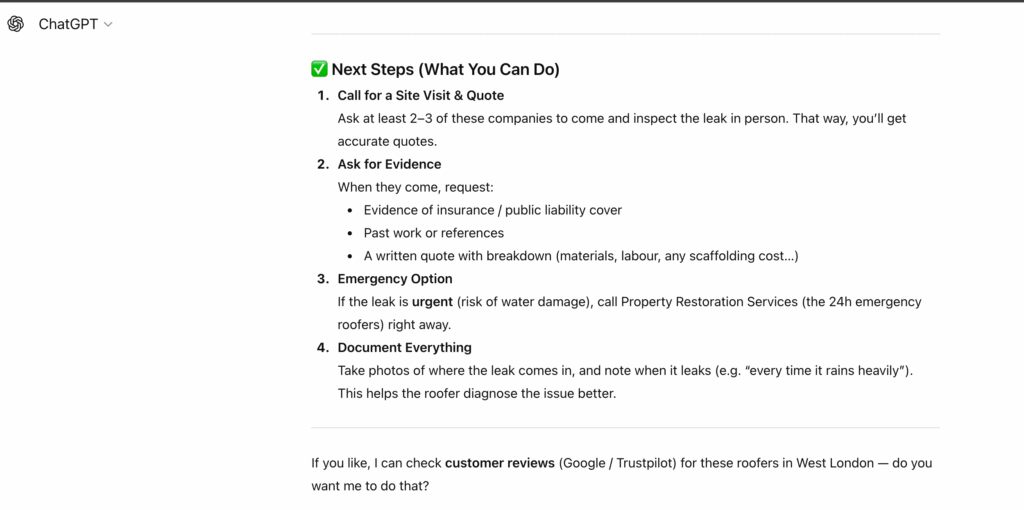
Then I got a summary of what others have thought about their work.
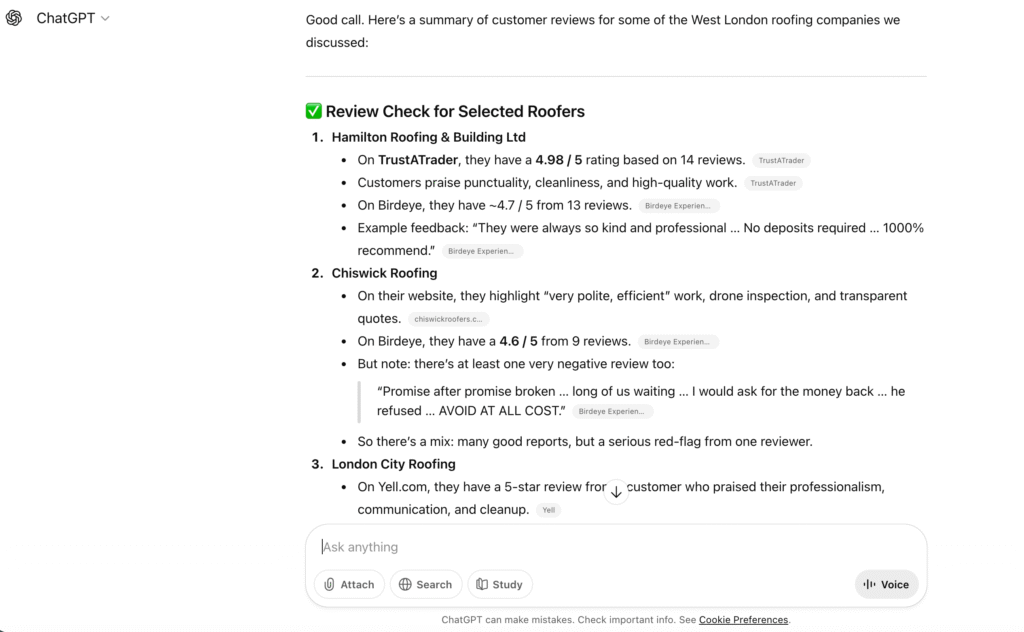
Key Takeaways of
- If your brand isn't shortlisted, you aren't getting calls
- Have prices and reviews clearly visible on your website (use structured data for traditional SEO)
- Get your reviews mentioned on review sites to add more credibility
- Manage your online reputation, bad reviews are fine if you respond to them
In short, AI search platforms are making it easier for consumers to find answers to more complex questions faster.
This poses a unique opportunity, especially for small business owners in traditional industries.
You can more easily get ahead of bigger competitors by having a strategic focus on getting recommended by AI searches. The easiest way to achieve that is to have recent reviews.
Why This Is a Real Threat to Lead Generation
For a home renovation company, reputation is everything. AI search tools, especially ones that cite sources like ChatGPT, pull heavily from:
- Google reviews
- Trustmary review pages
- Facebook reviews
- Portfolio sites
- Local directories
- Customer testimonials
- Articles mentioning your business
- Verified case studies
- Social proof across the web
If your presence is thin on these channels, AI tools simply don’t have enough evidence to decide you’re relevant.
You might be asking yourself:
“If AI can’t see strong reviews and proof of good work, it won’t recommend us, meaning customers won’t even know to call.”
Traditional Business Owners Thoughts on AI Search
There’s a mix of worry and urgency for traditional business owners regarding AI search.
- “We’ve worked for years to build our reputation.”
- “But these AI tools don’t know anything about us.”
- “People are asking AI for help and getting answers that don’t include my business.”
- “If we don’t adapt, our leads may dry up completely.”
This isn’t just a marketing problem. It’s a business survival problem.
What Every Traditional Business Owner Should Understand
Once owners and marketers understand how AI search works, they see the path forward:
- AI relies on trustworthy, structured, review-rich data.
- Companies with strong, visible online reputations get recommended.
- Social proof matters more today than ever, because AI reads it, summarizes it, and uses it to make suggestions.
- Websites need clear messaging backed by verified customer experiences.
- Review collection and display are no longer “nice to have”—they are the fuel AI uses to decide whether to surface a business or not.
The shift in thinking can look like this:
“If AI search is where customers are making decisions, then building a strong, visible reputation online is how we make sure we’re chosen.”
How a Renovation Company Can Reclaim Visibility in AI Search
Once the owner understands that AI tools recommend businesses based on trust signals, not keywords, the path forward becomes clearer. AI search rewards companies that have:
- A strong reputation
- Clear, consistent customer feedback
- Proof of completed work
- Engaged and satisfied clients
- Reliable, up-to-date information available online
Even though AI search feels new and confusing, the solution is rooted in something familiar: your reputation must be easy for AI to find and interpret.
What AI Tools Actually Look For
AI search works differently from Google’s old keyword-based system. Instead of matching words, it examines evidence.
Signals AI Systems Rely on When Recommending Local Renovation Companies:
1. Verified Customer Reviews
Google reviews, Facebook reviews, Trustmary-collected first-party reviews, and industry-specific reviews all count. AI tools often summarize or reference these directly.
2. The Consistency of Your Reputation.
Many strong, recent, positive reviews are better than a few old ones.
3. Clear Descriptions of Services
AI needs to understand what you do:
- kitchen renovations
- basement finishing
- additions
- exterior siding
- bathroom remodels
If these services aren’t clearly described online, AI models won’t associate your business with them.
4. Proof of Completed Projects
Photos, case studies, before–after galleries, and verified testimonials help AI determine what you’re actually good at.
5. Trust Signals Across the Web
Mentions in:
- Local directories
- Trade association sites
- Social media
- Project galleries
- Marketplace platforms
AI systems cross-check multiple sources. If you’re only present in one place, you become invisible.
Why Reviews Matter More Than Ever
AI tools like ChatGPT, Perplexity, and Gemini often reference or summarize online opinions from real customers.
If your renovation business has:
- No reviews
- Old reviews
- Very few reviews
- Reviews hidden away on platforms customers don’t use
…AI simply doesn’t have enough to go on.
On the other hand, if your business consistently collects customer feedback and showcases it publicly, AI recognizes you as a reliable option.
“AI can’t recommend us if we don’t give it anything to work with.”
Check how mature your customer review strategy currently is.
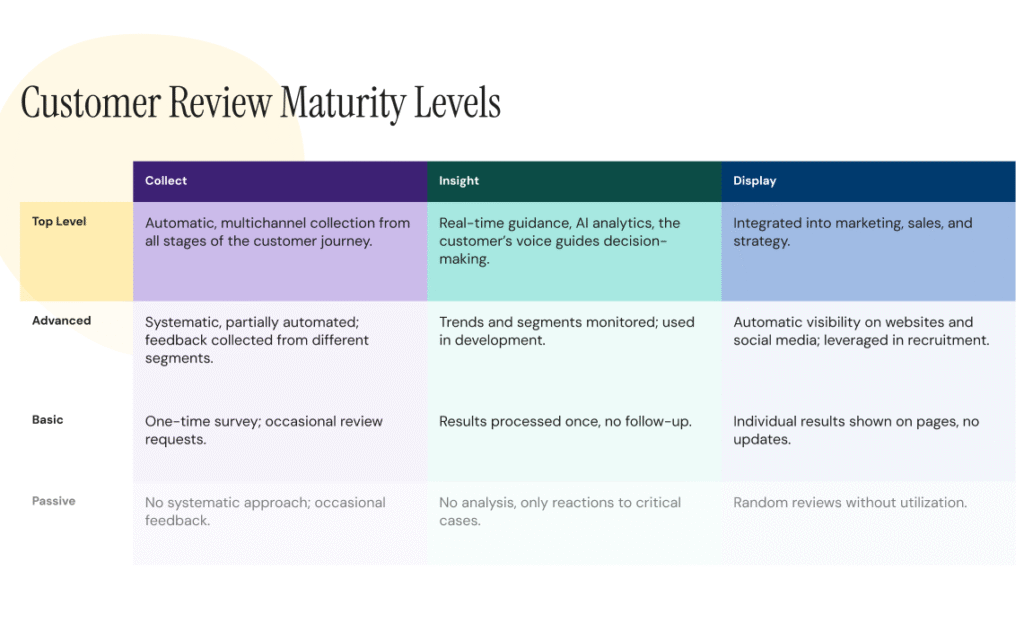
What to Do Right Now to Get AI Visibility
Here’s the practical, plain-language roadmap for getting AI visibility:
1. Build a Steady Stream of Fresh Reviews
Make it incredibly easy for every homeowner to leave a review right after a job. This gives AI search engines ongoing proof that you’re active and trustworthy.
2. Add All Reviews to Your Website and Search Engines
Not just as a wall of text, structured review embeds (such as Trustmary widgets and review page) present social proof in a format AI can understand and index.
AI search optimization is all about getting reliable third party sites to mention you.
Trustmary can generate an external review page that shows up in search engines and is used by AI powered search engines as source.
Read more about how an accounting company gained LLM visibility with Trustmary's review page.
3. Showcase Your Work Clearly
Upload:
- Before-and-after photos
- Case studies
- Short project summaries
AI looks for these signals the same way a new customer would.
4. Make Sure Your Service & Locations Pages Are Detailed
Write plainly:
- “We remodel bathrooms,”
- “We finish basements,
- “We build custom decks,”
- “We install new siding.”
AI linking only works when services are described unambiguously.
Detailed Service Listing Example for Electricians
- Consumer unit upgrades (18th Edition compliant)
- Rewiring specialists for Victorian homes
- Smart lighting & scene control systems
- Home cinema installation
- CCTV & security system integration
- EV charger installation
- Fire alarm system upgrades for HMOs
It makes a huge difference for search engines to see that you list "EV charger installation" instead of "electrician doing everything".
Get inspired by the strategies outlined in digital marketing for electricians and how to grow an HVAC business.
Create Location Pages
Create dedicated landing pages for all locations you operate in. If it isn't written, AI search (nor traditional search engines) will be able to know that.
Don't imply, write it out.
"We operate in North West England" shows up very differently than:
"We offer services in North West England in Greater Manchester (Manchester, Bolton, Wigan, Oldham), Liverpool City Region (Liverpool, Wirral, St Helens, Sefton), Lancashire (Preston, Blackpool, Burnley, Lancaster), Cheshire (Chester, Warrington, Crewe), Cumbria (Carlisle, Kendal, Barrow)".
5. Keep Your Business Information Consistent Everywhere
Your name, phone, address, service area, and offerings need to match across all platforms.
Consistency boosts credibility in AI’s eyes.
More on this can be found in our guide to mastering Google My Business profiles.
6. Use a Review Tool That Streamlines Everything
To win in AI search, a business needs volume, frequency, and visibility of reviews, not once a year, but continuously.
Automating this process ensures steady momentum.
Getting one review a week leads to getting 52 new reviews in a year.
Integrate Trustmary to your existing digital tools to ensure you're collecting feedback and reviews from every single customer.
These can then be automatically put on your website and search engines.
The Payoff: Becoming the Business AI Recommends
Once the owner starts feeding AI the right information, things change.
Suddenly, when someone asks an AI search engine:
- “Who’s a reliable contractor for a bathroom remodel in my area?”
- “Which renovation companies have great customer reviews?”
- “Who’s best for basement finishing near me?”
AI finally has enough evidence to choose your business, not by luck, but because you’ve given it a strong, trustworthy, review-backed profile to work with.
Add Trustmary to your existing workflows to collect more feedback and reviews, and make sure you are found online.
FAQ: AI Search, Renovation Leads & Online Visibility
Why have my Google leads dropped even though my website hasn’t changed?
Because customer behaviour has changed. People are no longer only typing short keywords like “bathroom remodeler.” They’re asking full questions to AI tools such as ChatGPT, Perplexity, Gemini, and Copilot. These tools often provide answers without sending traffic to websites. If your business isn’t mentioned in trusted sources, AI systems won’t surface you.
Does the surfacing of AI search engines mean Google is dead?
No. Google is still massively dominant, but Google is also shifting to AI-powered answers. Even a Google search now often begins with an “AI Overview,” which may list recommended companies without showing organic website links. This means your business needs stronger signals, reviews, reputation, and clear service descriptions, for AI systems to include you in their responses.
How do AI search engines decide which renovation companies to recommend?
AI tools pull from:
- The company's own website
- Google reviews
- Facebook reviews
- Local directories
- Trustmary review pages
- Portfolio websites
- Case studies
- Mentions in articles
- Social media
- Verified customer feedback
- Discussion forums
AI looks for evidence, not keywords.
If you haven’t created enough visible proof online, the AI simply cannot recommend you.
Can’t I just buy ads instead of focusing on AI search optimization?
Ads still work, but AI-powered search results appear before ads in Google’s new AI Overview boxes. You cannot outspend a missing reputation.
Strong reviews and clear service pages are the foundation that ads build on, not a replacement.
In addition, AI search engines don't currently have paid ads in them, but there have been rumours that ChatGPT will implement these at some point in 2026.
Do I really need more reviews to appear in AI searches?
Yes. AI search looks for:
- Recent reviews
- Frequent reviews
- Reviews across multiple sources
- Evidence of consistent service quality
A business with 10 old reviews looks “inactive” compared to a competitor adding 30 new reviews this year.
Does it matter what platform the reviews are on to get them to show up on AI search engines?
AI search engines cross-check multiple platforms.
The strongest signals come from:
- Trustmary review pages (highly structured and AI-friendly)
- Trustpilot, Facebook, ...
- Industry-specific directories (e.g., Checkatrade, Houzz, Rated People)
The broader your review footprint, the more confident AI becomes in recommending you.
How many reviews do I need to start ranking in AI search?
There’s no magic number, but most companies that show up consistently in AI shortlists:
- add reviews weekly or monthly
- have at least 30–50 recent reviews
- have reviews on multiple platforms
- respond to negative reviews rather than ignore them
It’s about consistency, not perfection.